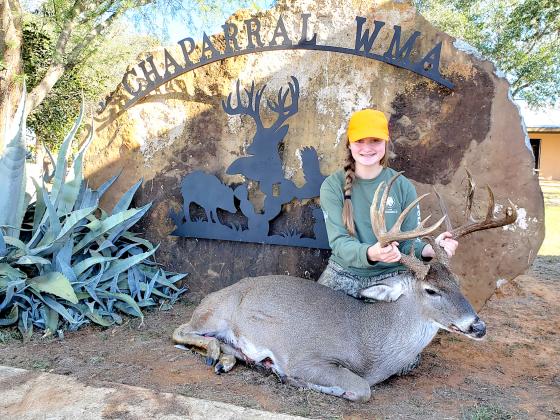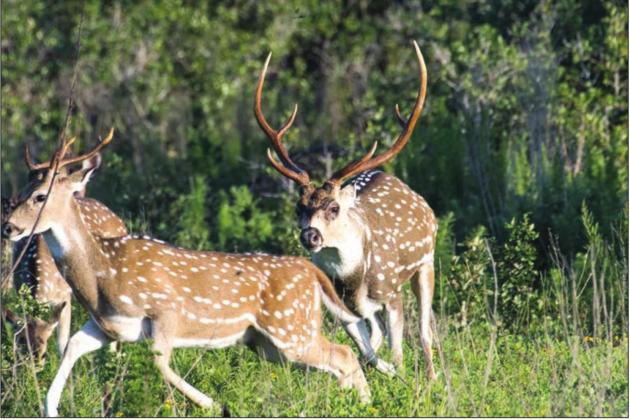Fall hunting seasons are still a few months away, but the time is just about ripe to ante up for shots at a slew of public lands hunting permits up for grabs this year through the Texas Parks and Wildlife Department’s lottery-style drawn hunt program.
The 2020-21 “Drawn Hunts” link on TPWD’s website — tpwd.texas.gov — went live before the July 4 holiday, according to Kelly Edmiston, TPWD public hunts coordinator.
Applying for permits is simple.
Visit the website to browse dozens of hunt categories for a long list of game, review hunt dates and find other pertinent information like previous success rates and application deadlines.
There are downloadable maps of each area, terrain descriptions, lists of special restrictions, all legal game and baiting rules and a long list of frequently asked questions.
The final application process takes only minutes to complete using a valid credit card. Random computer drawings for available permits are held the first business day following the application deadline. Selected applicants are notified by e-mail.
BIG ON VARIETY, LOW ON COST
Around for more than 50 years, TPWD’s drawn hunt program represents what is arguably one of the highest quality, low-cost hunting opportunities in the country.
For as little as $3-$10 per application, resident and non-resident hunters can apply individually or as a group for permits that provide hunting opportunities on more than 100 tracts of land including stateowned/managed wildlife management areas, state parks, national wildlife refuges, U.S. Forest Service properties and select private tracts.
If one name in a group application is drawn, everyone in the group is eligible to hunt. Some hunts limit the number of names that can be on an application.
The hunts cover a wide range of game species, including big game like white-tailed deer, mule deer, antelope and bighorn sheep; birds such as dove, turkey, quail, pheasant and waterfowl; small game like squirrels and rabbits, plus alligators, javelina, feral hogs and a variety of exotics. Most private tract hunts are guided.
The draw program is a great value, especially for hunters on a tight budget or those wanting to try something different or see new country. In most cases it gives selected applicants the opportunity to hunt on premium properties that see limited hunting pressure, often for a fraction of the cost charged by other states, said Justin Dreibelbis, TPWD’s private lands and public hunting program director.
“The Texas draw is significantly cheaper in most cases,” he said. “Many western states require applicants to buy a license before they are eligible to apply for a hunt. Some of these states also require hunters to front the cost of the tag to apply and will reimburse minus the cost of the application after the drawing. Texas simply charges $3 or $10 for the application, with permit fees only coming into play if a hunter is drawn.”
And those permit fees are nominal. Adult applicants selected for special permit and national wildlife refuge hunts are required to pay an additional fee that ranges $80-$130, depending on the hunt.
That’s a bargain for a multi-day hunt, especially one held on prime real estate known for above-average trophy potential or one that allows for the take of multiple animals on the same trip.
PERMITS ABUNDANT
Edmiston says almost 9,500 permits in 56 categories are available this year. About 5,100 special permits are designated for TPWD properties, close to 3,000 special permits for hunts on national wildlife refuges and nearly 1,400 USFS antlerless permits.
An additional 1 million acres of land available for low-cost, walk-in hunting for various species makes TPWD’s public hunting program even more attractive to hunters who may not be able to afford the cost of being on a lease. These lands, most in eastern Texas, require a $48 Annual Public Hunting Permit that provides season-long access.
“There probably is no better bang for your buck than what TPWD offers through its drawn or walkin hunts,” said Dreibelbis. “There are thousands of drawn hunt selections being done and more than 1 million acres of walk-in hunting lands. I don’t know where else you can go to get that.”
OPTIONS TO CHOOSE FROM
There are four draw hunt options — Special Permit Hunts, E-Post Card Selection Hunts, USFS Antlerless Deer Permits and National Wildlife Refuge Hunts.
With nearly 60 categories available, hunters can tailor applications to suit their preferred style of hunting and game species.
While many of the special permit deer hunts allow for the use of firearms, some are for archery gear only. There also are 15 separate “Youth Only” draws tucked within the hunt categories, Edmiston said.
The age window for youth hunts is 8-16 years old on state properties; 9-16 years old on national wildlife refuges. All youths must be accompanied in the field by an adult 18 or older who is hunter education certified. No more than three applications may be submitted for any Youth Hunt category.
The E-Postcard and USFS antlerless permits are unique from other public draw hunt options. There is no application fee or hunt fee required. However, hunters 17 and older are required to have a current APHP before applying. The 2020-21 APHP goes on sale Aug. 15, along with new hunting licenses.
NEW TO THE GAME
TPWD is constantly tweaking the drawn hunt program and expanding it with new tracts to make it more attractive. Two new additions this year include the 11,320-acre Hagerman National Wildlife Refuge in Grayson County and the 5,500-acre Roger Fawcett WMA in Palo Pinto County.
The Hagerman has a history of producing some outstanding whitetail bucks, including a former state record archery non-typical arrowed in 2001 by Jeff Duncan. Nicknamed “Big Boy,” Duncan’s 26-point buck netted 225 7/8 Boone and Crockett inches.
Dreibelbis says there will be 233 total permits awarded for three archery deer hunts scheduled for the Hagerman in November and December. Additionally, the refuge will host two feral hog hunts and one spring turkey hunt in 2021.
Dreibelbis says Hagerman NWR staff will continue to run deer hunts under a restrictive format requiring selected hunters to complete bowhunter education certification and an archery proficiency test with minimum score of 80%, before the hunt takes place.
POPULARITY GROWING
The drawn hunt program has always had a decent following, but participation has spiked since TPWD switched to an exclusive online application process.
Nearly 166,000 applications were received in 2019, more than triple the number received six years ago when TPWD did away with paper applications.
It will be interesting see what the numbers do in wake of an economic downturn spurred by the coronavirus outbreak and oil crash last spring. With many folks out of work and facing financial hardships, some hunters may be looking for a cheaper alternative than paying expensive dues for a private lease.
Dreibelbis says he won’t be surprised if there is another upswing in draw hunt applications this year.
“Given the increased demand for access to the outdoors during these strange times, coupled with the continued increase in interest in our TPWD public hunting draw system, I would not be the least bit surprised if we saw another increase in the number of special permit applications this next season,” he said.
There are plenty of good deals worth the gamble of a few bucks.



